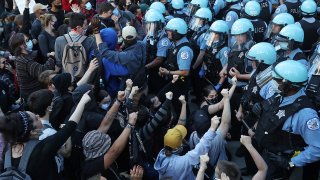
Chicago Police Department leadership "failed" both the public and its own officers in its response to protests and unrest following the death of George Floyd last year, according to a scathing new report from the city's watchdog agency that says CPD's efforts were marked "almost without exception, by confusion and lack of coordination" that investigators say may have set the city back in efforts to foster trust with the community.
The city's Office of Inspector General released the report Thursday, calling it an "in-depth review of the period of May 29 through June 7" when protests and unrest gripped Chicago and the nation after police in Minneapolis killed Floyd by kneeling on his neck for nearly nine minutes, his death captured on video that quickly spread around the world.
The OIG's 152-page report found that with respect to the demonstrations and unrest in the days after, "CPD was under-prepared and ill-equipped to respond to those events and as a result, the Department’s senior leadership failed both the public and its own front-line members."
"The challenges in responding to large-scale protests and unrest amidst a global pandemic were daunting, but the efforts of CPD and the City to stem unrest were marked, almost without exception, by confusion and lack of coordination in the field, emanating from failures of intelligence assessment, major event planning, field communication and operation, administrative systems and, most significantly, leadership from CPD’s highest ranks," a statement on the report reads.
The OIG found that the department's failures occurred in three specific areas: with breakdowns in the mass arrest process, by not fulfilling reporting obligations and with policy gaps that "crippled accountability processes."
In an interview with the OIG specifically on the response to protests downtown on May 29, a CPD officer said that the department "cannot make a written plan that details CPD's strategies for a protest, because protests are dynamic and devoting time to writing down a plan for an event would be a waste."
The OIG also noted that three members of the department's command staff said those protests were a "surprise" and that they had not received intelligence in advance that may have predicted them, so there were no preparatory meetings beforehand.
Local
Two officers responding to the protests told the OIG that "no one instructed them on what to do or where to go" and that they "did not believe command staff had a plan in place to deal with the protesters."
One of those officers described CPD's strategy as "whack-a-mole, where officers would run from situation to situation without a strategy, while the other described the lack of preparation as "sad, since everyone with access to social media knew that violence was brewing, except for CPD command staff and City Hall."
"CPD and the City will be dealing with the negative repercussions of the shortcomings revealed here for some time," Deputy Inspector General for Public Safety Deborah Witzburg said in a statement on the report.
"Missing reports and videos may limit or preclude accountability for people who committed crimes and CPD members who committed misconduct." she continued. "OIG’s interviews with rank-and-file CPD members laid bare that, at least in some quarters, chaos and confusion in the command staff ranks struck a serious blow to the morale of front-line members who plainly felt failed by the Department, after being left to high-stakes improvisation without adequate support or guidance.
"And where there were out-of-policy, dangerous, and disrespectful actions by CPD members, the events of May and June 2020 may have set CPD and the City back significantly in their long-running, deeply challenged effort to foster trust with members of the community," she added in a seeming reference to CPD's ongoing process to enact sweeping reforms under a consent decree following a 2017 report from the U.S. Department of Justice that found the department had a history of civil rights violations by officers, including a "pattern and practice" of excessive force and abuse.



